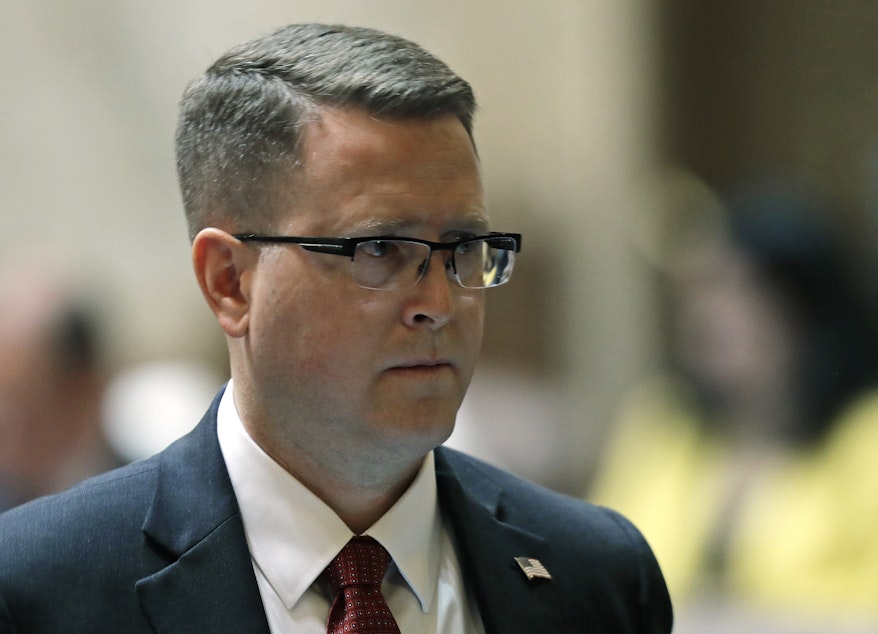'This was a positive way for Evangelicals to rebrand themselves' — the troubles of Matt Shea, Ukraine and international adoptions

Last month, former Washington state Rep. Matt Shea flew to Ukraine.
There, he helped transport 63 children originally from Mariupol to Kazimierz Dolny, a small town in Poland. He says he was trying to bring those kids back to America to be adopted.
Others say this move is representative of a larger issue in the adoption industry.
Shea is known for representing the Fourth District, in Eastern Washington, for six terms. He's also known for being accused of domestic terrorism for his involvement with the Malheur National Wildlife Refuge standoff. In 2019, members of his party voted to suspend him from the state House Republican caucus over the incident.
Speaking on a Polish TV show, Shea said he was in the country volunteering with a Texas-based group called Loving Families and Homes for Orphans.
Sounds simple enough. But then, the story got more complicated.
Spokesman review reporter Eli Francovich says locals in Poland started asking questions about what was happening with the kids. And when reporters looked into the hosting group, Loving Families and Homes for Orphans -- information was sparse.
"The organization itself had a website that wasn't working," Francovich said. "But then they had another one that was much harder to find, and that didn't have much information. Another great local reporter from Spokane pointed out that some of the text actually was just taken from another hosting organization."
Sponsored
Polish government officials seized guardianship of the children, meaning Shea can't take them out of the country.
Which matches what the Ukrainian government has asked for - a moratorium on adoptions until the war with Russia has ceased.
Shea said that the children, or their guardians, asked for help. And that he answered the call.
“You have a lot of very, very upset parents right now who were ecstatic that their kids were rescued out of a warzone, brought to safety, and now the media is literally trying to put some insidious motivation behind this when really it’s about making sure there are no more orphans left in the world," he said. "And every child deserves a loving and safe home.”
Kathryn Joyce, an investigative reporter for Salon and author of The Child Catchers: Rescue, Trafficking and the New Gospel of Adoption, said there are good reasons to put the brakes on international adoptions or hosting programs in the wake of humanitarian disasters. Shea's efforts echo a pattern found in the Evangelical adoption movement.
Sponsored
Joyce said the movement began in the mid-2000s, and really exploded following the 2010 earthquake in Haiti.
"This was a means of addressing what they frequently called the worldwide orphan crisis," Joyce said. "And that this was also a positive way for Evangelicals to sort of rebrand themselves. For a movement that had become known primarily for its vocal opposition to reproductive rights, or LGBTQ rights, this would be some sort of positive thing that they could do in the world instead."
That push for international adoptions has previously led to child trafficking, such as in the case of Laura Silsby, an Idaho businesswoman who in 2010 attempted to cross the Haiti-Dominican Republic border with 33 Haitian children.
Joyce said the problem often stems from a misunderstanding of what it means to be an orphan.
Often, children are brought to orphanages because parents are not financially or physically able to care for them, not because they don't have a family at all. And that family is often planning to come back and reclaim their children.
Sponsored
"In the US, we would not call somebody who had only lost one parent an orphan," Joyce said. "We would not look at them automatically as somebody that was eligible for being removed not only from their family, but from their country, and brought into another family. But we have a tendency to sort of overlook those things when when we're talking about other countries."
Typically, when a child is adopted internationally, there's a process of checks, to make sure there isn't a family that's planning on returning for their child.
But during an international crisis, those checks are often waved. Meaning sometimes a child brought to the United States is leaving a loving family behind.
So, it's understandable that people would want to bring children out of a conflict zone. It's just more complicated than you might think.
When it comes to Ukraine, Joyce said now is not the time to remove children labelled as "orphans."
Sponsored
"Ukraine, and Ukrainian authorities, just simply do not have the capacity to do the job that they need to do in order to make sure these adoptions are ethical and sound," she said. "And it's just not the time in this catastrophe to be fast tracking these sorts of permanent solutions."





